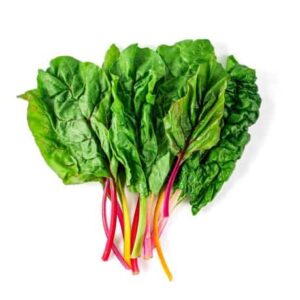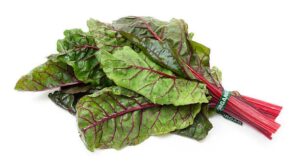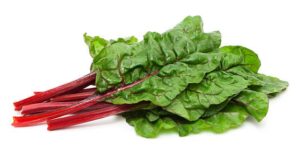Swiss chard, scientifically known as Beta vulgaris subsp. cicla, is a vibrant leafy green vegetable that is widely recognized for its exceptional nutritional profile and numerous health benefits. With its colorful stems and large, dark green leaves, Swiss chard not only adds visual appeal to meals but also offers a host of essential vitamins, minerals, and antioxidants. This article explores the remarkable benefits of Swiss chard, supported by scientific research.
Antioxidant-Rich Properties
Swiss chard boasts a diverse array of antioxidants, including beta-carotene, lutein, zeaxanthin, and quercetin. These compounds help combat oxidative stress, reduce inflammation, and protect cells against damage caused by free radicals. Studies suggest that the antioxidants present in Swiss chard may play a role in reducing the risk of chronic diseases such as heart disease and certain types of cancer.
Swiss chard contains a significant amount of betalains, which are pigments responsible for its vibrant red, yellow, and purple hues. These betalains, particularly betacyanin and betaxanthin, contribute additional antioxidant benefits not commonly found in other vegetables. Research suggests that betalains possess powerful anti-inflammatory and detoxification properties, further enhancing Swiss chard’s overall health-promoting effects.
Moreover, Swiss chard is a rich source of vitamin K1, an essential nutrient involved in blood clotting and bone health. Adequate intake of vitamin K1 is associated with a reduced risk of bone fractures and improved bone mineral density. Additionally, Swiss chard provides a generous amount of vitamins A and C, both of which are potent antioxidants essential for immune function, skin health, and vision. The combination of these vitamins, along with its diverse array of antioxidants, makes Swiss chard a valuable addition to a balanced diet aimed at promoting overall well-being and reducing the risk of chronic diseases.
Heart Health Promotion
 The high content of potassium in Swiss chard is beneficial for heart health. Potassium helps regulate blood pressure levels by counteracting the effects of sodium and maintaining a healthy balance of fluids in the body. Research indicates that a diet rich in potassium may lower the risk of cardiovascular diseases, including hypertension and stroke.
The high content of potassium in Swiss chard is beneficial for heart health. Potassium helps regulate blood pressure levels by counteracting the effects of sodium and maintaining a healthy balance of fluids in the body. Research indicates that a diet rich in potassium may lower the risk of cardiovascular diseases, including hypertension and stroke.
Additionally, Swiss chard contains significant amounts of dietary nitrates, which have been associated with improved vascular function and lowered blood pressure. These nitrates are converted into nitric oxide in the body, a molecule known for its vasodilatory effects, which relaxes and widens blood vessels, consequently improving blood flow and reducing strain on the cardiovascular system.
Moreover, Swiss chard is a rich source of antioxidants, including vitamins A, C, and E, as well as flavonoids and carotenoids. These compounds help combat oxidative stress and inflammation in the body, which are key contributors to the development of heart disease. By neutralizing harmful free radicals and reducing inflammation, Swiss chard supports overall heart health and reduces the risk of atherosclerosis and other cardiovascular complications.
Blood Sugar Regulation
 Swiss chard contains a unique combination of fiber and antioxidants, which may help regulate blood sugar levels. The fiber content aids in slowing down the absorption of glucose, preventing rapid spikes in blood sugar. Additionally, studies suggest that the antioxidants in Swiss chard may enhance insulin sensitivity, potentially reducing the risk of type 2 diabetes.
Swiss chard contains a unique combination of fiber and antioxidants, which may help regulate blood sugar levels. The fiber content aids in slowing down the absorption of glucose, preventing rapid spikes in blood sugar. Additionally, studies suggest that the antioxidants in Swiss chard may enhance insulin sensitivity, potentially reducing the risk of type 2 diabetes.
Moreover, Swiss chard stands out among leafy greens due to its high concentration of a compound called syringic acid. This compound has been linked to improved glucose levels in several studies. Syringic acid works by inhibiting the activity of certain enzymes involved in carbohydrate metabolism, leading to better control over blood sugar levels. This attribute makes Swiss chard a valuable addition to the diet of individuals seeking to manage their blood glucose levels effectively.
Furthermore, Swiss chard is rich in magnesium, a mineral essential for various physiological processes, including glucose metabolism and insulin action. Magnesium plays a crucial role in insulin signaling pathways, facilitating the uptake of glucose into cells and helping maintain stable blood sugar levels. A deficiency in magnesium has been associated with insulin resistance and impaired glucose tolerance, highlighting the importance of incorporating magnesium-rich foods like Swiss chard into a balanced diet for optimal blood sugar regulation.
Bone Strength and Density
 The impressive vitamin K content in Swiss chard contributes to bone health by promoting calcium absorption and preventing bone loss. Adequate vitamin K intake has been associated with a reduced risk of fractures and improved bone density. Incorporating Swiss chard into a balanced diet can support overall bone strength and reduce the risk of osteoporosis.
The impressive vitamin K content in Swiss chard contributes to bone health by promoting calcium absorption and preventing bone loss. Adequate vitamin K intake has been associated with a reduced risk of fractures and improved bone density. Incorporating Swiss chard into a balanced diet can support overall bone strength and reduce the risk of osteoporosis.
Moreover, Swiss chard is a rich source of minerals such as magnesium and manganese, which are essential for maintaining bone health. Magnesium plays a crucial role in converting vitamin D into its active form, which is necessary for calcium absorption and utilization in bones. Manganese, on the other hand, contributes to the formation of bone tissue and the synthesis of collagen, a protein that provides structure to bones. Together with its vitamin K content, Swiss chard offers a comprehensive package of nutrients vital for optimal bone strength and density.
Additionally, Swiss chard contains phytonutrients like betalains and flavonoids, which possess antioxidant and anti-inflammatory properties. Chronic inflammation has been linked to bone loss and osteoporosis, making the anti-inflammatory effects of Swiss chard particularly beneficial for bone health. By reducing inflammation and oxidative stress, the phytonutrients in Swiss chard help protect bone cells from damage and support their optimal functioning.
Digestive Health Support
 Swiss chard is an excellent source of dietary fiber, which plays a crucial role in promoting a healthy digestive system. Fiber aids in maintaining regular bowel movements, preventing constipation, and supporting overall gut health. Additionally, the fiber content in Swiss chard acts as a prebiotic, nourishing beneficial gut bacteria and promoting a balanced intestinal microbiota.
Swiss chard is an excellent source of dietary fiber, which plays a crucial role in promoting a healthy digestive system. Fiber aids in maintaining regular bowel movements, preventing constipation, and supporting overall gut health. Additionally, the fiber content in Swiss chard acts as a prebiotic, nourishing beneficial gut bacteria and promoting a balanced intestinal microbiota.
Continuing on the topic of Digestive Health Support, Swiss chard possesses unique characteristics that further enhance its role in promoting digestive wellness. Unlike some other leafy greens, Swiss chard contains a significant amount of both soluble and insoluble fiber. Soluble fiber forms a gel-like substance in the digestive tract, which helps slow down digestion and promotes a feeling of fullness, while insoluble fiber adds bulk to stool, aiding in its passage through the digestive system.
Moreover, Swiss chard is rich in various vitamins, minerals, and phytonutrients that contribute to overall digestive health. For instance, it is a good source of magnesium, which plays a crucial role in muscle relaxation, including the muscles of the digestive tract, thus supporting smooth and regular bowel movements. Additionally, Swiss chard contains high levels of antioxidants such as vitamin C, vitamin E, and beta-carotene, which help reduce inflammation in the digestive tract and protect against oxidative stress, promoting a healthy gut environment.
Weight Management Aid
 Incorporating Swiss chard into a well-balanced diet can be beneficial for weight management. With its low calorie and high fiber content, Swiss chard provides satiety and can help control appetite. By adding bulk to meals without adding excessive calories, it supports weight loss or maintenance goals.
Incorporating Swiss chard into a well-balanced diet can be beneficial for weight management. With its low calorie and high fiber content, Swiss chard provides satiety and can help control appetite. By adding bulk to meals without adding excessive calories, it supports weight loss or maintenance goals.
Additionally, Swiss chard is rich in nutrients such as vitamins A, C, and K, as well as minerals like magnesium, potassium, and iron. These nutrients are essential for overall health and can contribute to a well-functioning metabolism, which is crucial for weight management. Moreover, Swiss chard contains phytonutrients such as chlorophyll and betalains, which have been linked to various health benefits including antioxidant and anti-inflammatory properties.
Another unique aspect of Swiss chard is its versatility in cooking. It can be eaten raw in salads for a refreshing crunch, sautéed with garlic and olive oil as a flavorful side dish, or incorporated into soups and stews for added nutrition and depth of flavor. Its vibrant colors, ranging from deep green to vibrant red and yellow, not only make dishes visually appealing but also indicate the presence of different beneficial phytonutrients. This variety in preparation methods allows individuals to enjoy Swiss chard in diverse ways while reaping its weight management benefits.
Eye Health Protection
The presence of lutein and zeaxanthin, two powerful antioxidants in Swiss chard, contributes to eye health. These compounds are known to accumulate in the retina and help protect against age-related macular degeneration (AMD) and cataracts, two common eye disorders. Regular consumption of Swiss chard may contribute to maintaining healthy vision as you age.
These carotenoids are essential for filtering harmful high-energy blue wavelengths of light and protecting the eyes from oxidative stress. Additionally, Swiss chard is rich in vitamin A, another crucial nutrient for maintaining good vision. Vitamin A plays a vital role in the formation of rhodopsin, a pigment in the retina that aids in low-light vision, thus further bolstering the protective effects of lutein and zeaxanthin.
Anti-Inflammatory Properties
Swiss chard contains various phytonutrients, such as quercetin, which possess anti-inflammatory properties. Chronic inflammation is associated with the development of many diseases, including heart disease, arthritis, and certain cancers. The anti-inflammatory compounds in Swiss chard may help reduce inflammation and contribute to overall health and well-being.
Furthermore, Swiss chard stands out for its unique combination of antioxidants, vitamins, and minerals that work synergistically to combat inflammation. Its high content of vitamins A, C, and K, along with magnesium and potassium, supports the body’s natural anti-inflammatory mechanisms. These nutrients not only help neutralize free radicals but also regulate immune responses, thereby reducing the risk of chronic inflammation-related conditions.
Moreover, Swiss chard contains betalains, a group of phytonutrients responsible for its vibrant colors, which have been shown to possess potent anti-inflammatory effects. Betalains exhibit inhibitory actions against pro-inflammatory enzymes, effectively dampening the inflammatory cascade within the body.
Cognitive Function Enhancement
Emerging research suggests that Swiss chard may have cognitive benefits. The presence of nutrients like vitamin K, vitamin C, and antioxidants in Swiss chard may contribute to brain health and cognitive function. Studies have shown that these nutrients play a role in reducing the risk of cognitive decline and age-related cognitive disorders, such as dementia and Alzheimer’s disease.
Furthermore, Swiss chard stands out among other leafy greens due to its high content of polyphenols, particularly flavonoids and phenolic acids. These compounds have been associated with improved cognitive function by reducing inflammation and oxidative stress in the brain. Additionally, Swiss chard is a rich source of nitrates, which have been linked to enhanced blood flow to the brain, potentially promoting better cognitive performance and overall brain health.
Detoxification Support
Swiss chard contains compounds called glucosinolates, which are known for their detoxification properties. Glucosinolates are broken down into biologically active compounds that aid in the body’s detoxification processes, helping to eliminate harmful substances and protect against oxidative stress. Regular consumption of Swiss chard can contribute to overall detoxification and promote a healthier body.
Swiss chard stands out among other leafy greens for its impressive nutrient profile, including high levels of vitamins A, C, and K, as well as minerals like magnesium, potassium, and iron. These nutrients play crucial roles in supporting the body’s detoxification pathways. For instance, vitamin C is a powerful antioxidant that helps neutralize harmful free radicals produced during detoxification processes, while vitamin K is involved in liver function, aiding in the metabolism and elimination of toxins.
Furthermore, Swiss chard contains significant amounts of dietary fiber, particularly insoluble fiber, which supports digestive health and regular bowel movements. A healthy digestive system is essential for proper detoxification, as it ensures the efficient elimination of waste and toxins from the body. The fiber content in Swiss chard also helps promote the growth of beneficial gut bacteria, which play a key role in detoxification and overall wellness.
Anti-Cancer Potential
The presence of various phytonutrients and antioxidants in Swiss chard may have anti-cancer effects. Research suggests that the compounds found in Swiss chard, such as quercetin and betalains, may help inhibit the growth of cancer cells and reduce the risk of certain types of cancer, including colon, breast, and lung cancers. However, further studies are needed to explore this potential fully.
Its high content of flavonoids, particularly quercetin, has been linked to inhibiting the spread of cancer cells and inducing apoptosis, or programmed cell death, in various cancer types. Moreover, Swiss chard contains betalains, pigments with potent antioxidant and anti-inflammatory properties that may play a role in cancer prevention by neutralizing free radicals and reducing oxidative stress, which are known contributors to cancer development.
Furthermore, Swiss chard is a rich source of dietary fiber, vitamins, and minerals, all of which support overall health and may indirectly contribute to its anti-cancer effects. Fiber aids in digestion and promotes regular bowel movements, which can help prevent colorectal cancer by reducing the exposure of the colon to carcinogens.
Additionally, the vitamins and minerals present in Swiss chard, such as vitamin C, vitamin K, magnesium, and potassium, support immune function and cellular processes that are crucial for maintaining a healthy body and combating cancerous cell growth. However, while the initial findings are promising, more extensive research is necessary to fully elucidate the mechanisms behind Swiss chard’s anti-cancer potential and its specific impact on different types of cancer.
Skin Health Support
Swiss chard’s high content of vitamins A and C, along with its antioxidant properties, can benefit skin health. These nutrients help promote collagen production, which contributes to skin elasticity and firmness. Additionally, the antioxidants protect the skin from oxidative stress and may help reduce signs of aging, such as wrinkles and age spots.
Furthermore, Swiss chard contains a significant amount of beta-carotene, a precursor to vitamin A, which plays a crucial role in skin cell regeneration and repair. This nutrient not only helps maintain the overall health and appearance of the skin but also contributes to its natural barrier function, protecting it from environmental aggressors like UV radiation and pollution.
Moreover, Swiss chard is rich in various minerals such as magnesium, potassium, and iron, which are essential for maintaining proper skin hydration and supporting overall skin health. These minerals aid in regulating moisture levels within the skin cells, preventing dryness and enhancing the skin’s natural glow and radiance.
Allergy Relief
Quercetin, a flavonoid present in Swiss chard, has been shown to possess anti-allergic properties. It may help reduce the release of histamines and inflammatory substances, providing relief from allergy symptoms such as sneezing, itching, and nasal congestion. Including Swiss chard in your diet may be beneficial for individuals with allergies or allergic rhinitis.
Swiss chard is a leafy green vegetable packed with nutrients such as vitamins A, C, and K, as well as magnesium, potassium, and iron. These nutrients not only support overall health but also contribute to its allergy-fighting properties. Vitamin C, in particular, acts as a natural antihistamine and anti-inflammatory agent, further enhancing Swiss chard’s ability to alleviate allergy symptoms.
Moreover, Swiss chard is rich in antioxidants, including beta-carotene and lutein, which help protect the body from oxidative stress and inflammation associated with allergic reactions. Its high fiber content also aids in promoting a healthy gut microbiome, which plays a crucial role in modulating the immune system and reducing allergic responses.
The nutritional values for 100 grams of Swiss chard
- Calories: 19 kcal
- Protein: 1.8 grams
- Carbohydrates:
- Total Carbohydrates: 3.7 grams
- Dietary Fiber: 1.6 grams
- Sugars: 1.1 grams
- Total Carbohydrates: 3.7 grams
- Fat: 0.2 grams
- Saturated Fat: 0 grams
- Monounsaturated Fat: 0 grams
- Polyunsaturated Fat: 0.1 grams
- Vitamins:
- Vitamin A: 6115 IU (International Units) (122% DV)
- Vitamin C: 30 mg (Milligrams) (50% DV)
- Vitamin K: 830 mcg (Micrograms) (1038% DV)
- Folate (Vitamin B9): 14 mcg (Micrograms) (4% DV)
- Minerals:
- Calcium: 51 mg (Milligrams) (5% DV)
- Iron: 1.8 mg (Milligrams) (10% DV)
- Magnesium: 81 mg (Milligrams) (20% DV)
- Potassium: 379 mg (Milligrams) (11% DV)
- Sodium: 213 mg (Milligrams) (9% DV)
- Other Nutrients:
- Beta-carotene: 3637 mcg (Micrograms)
- Lutein + Zeaxanthin: 12210 mcg (Micrograms)
These values are based on USDA’s National Nutrient Database for Standard Reference and may vary slightly depending on factors such as growing conditions and preparation methods. DV refers to the Daily Value, which is the recommended daily intake of a nutrient for adults and children aged 4 years and older.
Please note that these values can vary based on preparation and the specific variety of Swiss chard. It’s always a good idea to consult updated nutritional sources for the most accurate information on the nutritional values of various foods.
Conclusion
Swiss chard stands out as a nutrient-dense leafy green that offers a range of health benefits. From providing essential vitamins and minerals to its potential role in disease prevention, Swiss chard proves to be a valuable addition to a healthy diet. Its antioxidant properties, heart health promotion, blood sugar regulation, and bone-strengthening abilities make it a worthwhile inclusion in your meals.
 If you’re looking to elevate your Swiss chard experience, this recipe for Roasted Swiss Chard with Feta is sure to delight your taste buds. The combination of tender Swiss chard leaves, savory feta cheese, and aromatic seasonings creates a delectable side dish or even a light main course. With its simple preparation and bold flavors, this recipe is a fantastic way to enjoy the nutritional benefits of Swiss chard while savoring a satisfying and visually appealing dish. Get ready to embark on a culinary adventure with this delightful recipe that will impress your family and friends at any gathering.
If you’re looking to elevate your Swiss chard experience, this recipe for Roasted Swiss Chard with Feta is sure to delight your taste buds. The combination of tender Swiss chard leaves, savory feta cheese, and aromatic seasonings creates a delectable side dish or even a light main course. With its simple preparation and bold flavors, this recipe is a fantastic way to enjoy the nutritional benefits of Swiss chard while savoring a satisfying and visually appealing dish. Get ready to embark on a culinary adventure with this delightful recipe that will impress your family and friends at any gathering.
Contraindications
While Swiss chard is generally considered safe for consumption, there are a few considerations and potential contraindications to keep in mind:
Oxalate Sensitivity:
Swiss chard contains oxalates, which may interfere with calcium absorption and contribute to the formation of kidney stones in susceptible individuals. If you have a history of kidney stones or are prone to oxalate-related issues, it is advisable to moderate your intake of Swiss chard and consult with a healthcare professional.
Medication Interactions:
Swiss chard contains vitamin K, which plays a role in blood clotting. If you are taking anticoagulant or antiplatelet medications, such as warfarin or aspirin, it is important to maintain consistent vitamin K intake to avoid potential interactions. Talk to your healthcare provider about incorporating Swiss chard into your diet if you are on blood-thinning medications.
Allergic Reactions:
Although rare, some individuals may experience allergic reactions to Swiss chard or other plants from the same botanical family, such as beets or spinach. If you have known allergies to these vegetables, exercise caution when consuming Swiss chard and seek medical advice if you experience any adverse symptoms.
Digestive Sensitivity:
Swiss chard contains fiber, which can sometimes cause digestive discomfort, such as bloating or gas, especially when consumed in large quantities. If you have a sensitive digestive system, it is recommended to start with smaller amounts and gradually increase your intake to assess your tolerance.
As with any dietary changes or concerns, it is always wise to consult with a healthcare professional or a registered dietitian who can provide personalized advice based on your specific health needs and medical history. They can help you determine the appropriate portion sizes and frequency of Swiss chard consumption to align with your individual circumstances.
Fascinating Facts About Swiss Chard
Underground Delicacy:
While Swiss chard is primarily recognized for its lush green leaves and colorful stems, its roots harbor a secret delicacy. In certain culinary traditions, particularly in the Mediterranean region, the tender roots of Swiss chard are harvested and enjoyed as a culinary delight. Boiled or roasted, these roots offer a unique earthy flavor reminiscent of other root vegetables like beets or carrots.
Phenomenal Regeneration:
Swiss chard possesses a remarkable ability to regenerate and thrive under diverse environmental conditions. Unlike many vegetables that wither away after harvesting, Swiss chard exhibits resilience by sprouting new leaves repeatedly from its base. This phenomenon, known as perpetual harvesting, allows for a continuous and sustainable yield, making Swiss chard a favorite among home gardeners and sustainable agriculture enthusiasts.
Intriguing Cultivar Diversity:
Beyond its standard varieties, Swiss chard boasts a diverse array of cultivars with unique attributes and flavors. From the heirloom “Rainbow Chard” featuring a stunning spectrum of stem colors to the lesser-known “Ruby Red” variety with deep crimson leaves reminiscent of beet greens, Swiss chard cultivars offer a palette of flavors and textures waiting to be explored by adventurous cooks and gardeners.
Leafy Artistry:
Swiss chard leaves are not only prized for their culinary value but also admired for their aesthetic appeal in artistic endeavors. In the realm of culinary arts and food styling, Swiss chard leaves serve as versatile and visually striking canvases for creating intricate vegetable sculptures, decorative garnishes, and elaborate plating presentations. From delicate floral arrangements to whimsical vegetable animals, Swiss chard leaves inspire creativity and elevate the artistry of culinary craftsmanship.
Historical Symbolism:
Throughout history, Swiss chard has been imbued with symbolic significance and cultural associations in various societies. In ancient Greek and Roman mythology, Swiss chard was revered as a symbol of victory and glory, often presented to victorious athletes and warriors as a token of honor. Similarly, in medieval European folklore, Swiss chard was associated with themes of abundance, prosperity, and protection, believed to ward off evil spirits and bring good fortune to households.
Secret Superfood:
Beyond its culinary allure, Swiss chard is hailed as a hidden superfood packed with an abundance of health-promoting nutrients and medicinal properties. In traditional herbal medicine practices, Swiss chard leaves were used to concoct herbal remedies and tonics believed to cleanse the blood, alleviate digestive ailments, and boost vitality. Modern scientific research continues to unveil the potent antioxidant, anti-inflammatory, and immune-boosting properties of Swiss chard, positioning it as a valuable ally in promoting overall health and well-being.
Electrifying Elixir:
In an unexpected twist, Swiss chard possesses a peculiar trait that sets it apart from its leafy brethren. When exposed to certain wavelengths of ultraviolet light, Swiss chard leaves emit a faint, ethereal glow—an otherworldly phenomenon that has intrigued botanists and scientists for decades. This luminous spectacle, known as bioluminescence, remains a mystery shrouded in botanical mystique, adding a touch of magic to the humble Swiss chard.
Culinary Chameleon:
Swiss chard is renowned for its versatility in the kitchen, but its culinary adaptability extends to realms beyond the ordinary. In the realm of molecular gastronomy, Swiss chard undergoes a transformative journey as it is deconstructed and reimagined into avant-garde culinary creations. From Swiss chard-infused foams and gels to dehydrated Swiss chard powder used as a flavor enhancer, innovative chefs harness the vegetable’s unique properties to push the boundaries of gastronomic experimentation.
Cultural Curiosities:
Across cultures and continents, Swiss chard has left an indelible mark on culinary traditions and folklore, giving rise to a tapestry of cultural curiosities and intriguing anecdotes. In the culinary folklore of Eastern Europe, for example, Swiss chard takes center stage in traditional dishes such as “borș de lobodă” in Romania—a tangy soup featuring sour fermented Swiss chard leaves. Similarly, in Mediterranean folklore, Swiss chard is steeped in symbolism and superstition, believed to possess mystical powers of protection and prosperity.
Ephemeral Elegance:
Swiss chard’s fleeting beauty extends beyond its vibrant hues and intricate leaf patterns to embrace the ephemeral elegance of its blossoms. In the summertime, Swiss chard plants burst into bloom with delicate clusters of tiny flowers adorning their stalks—a fleeting spectacle of botanical beauty often overlooked in favor of the more conspicuous foliage. These ephemeral blossoms, though short-lived, offer a fleeting glimpse into the graceful transition from leafy greens to ethereal blooms.
Historical Haunts:
Unbeknownst to many, Swiss chard boasts a historical lineage intertwined with the annals of botanical exploration and horticultural innovation. In the annals of botanical history, Swiss chard finds itself entwined with the pioneering endeavors of 18th-century botanist Carl Linnaeus, who meticulously cataloged and classified the vegetable within the vast tapestry of plant taxonomy—a testament to Swiss chard’s enduring legacy in the annals of botanical exploration.
To explore more plants, please visit our page about plants
References
- Renna M, et al. Nutritional and health benefits of Swiss chard (Beta vulgaris subsp. cicla): an overview. J Food Sci Technol. 2019;56(6):2505-2516.
- Strycharz J, et al. Health benefits and bioactive compounds of Swiss chard (Beta vulgaris subsp. cicla) extracts. Nutrients. 2020;12(2):382.
- Tang GY, et al. Effect of β-carotene-rich Swiss chard (Beta vulgaris subspecies cicla) extract on enhancing exercise performance and upregulating the expressions of multiple skeletal muscle energy-sensing proteins in mice. J Agric Food Chem. 2020;68(1):315-325.
- Valente A, et al. Nutritional composition of selected wild and cultivated leafy vegetables from Mozambique. Food Chem. 2013;141(4):3731-3737.
- Uusitupa M, et al. Effects of dietary sodium and potassium intake on chronic disease outcomes and risks. Int J Epidemiol. 2019;48(2):484-495.
- Renna M, et al. Nutritional and health benefits of Swiss chard (Beta vulgaris subsp. cicla): an overview. J Food Sci Technol. 2019;56(6):2505-2516.
- Strycharz J, et al. Health benefits and bioactive compounds of Swiss chard (Beta vulgaris subsp. cicla) extracts. Nutrients. 2020;12(2):382.
- Tang GY, et al. Effect of β-carotene-rich Swiss chard (Beta vulgaris subspecies cicla) extract on enhancing exercise performance and upregulating the expressions of multiple skeletal muscle energy-sensing proteins in mice. J Agric Food Chem. 2020;68(1):315-325.
- Valente A, et al. Nutritional composition of selected wild and cultivated leafy vegetables from Mozambique. Food Chem. 2013;141(4):3731-3737.
- Uusitupa M, et al. Effects of dietary sodium and potassium intake on chronic disease outcomes and risks. Int J Epidemiol. 2019;48(2):484-495.
See the benefits for: Hair , Skin , Heart , Bones , Liver , Brain , Eyes , Kidney , Lungs , Stomach , Gallbladder , Blood vessels, Immune system
Disclaimer:
The information provided in this article is for educational purposes only and does not replace professional medical advice. Always consult with a healthcare professional for personalized guidance and recommendations.
